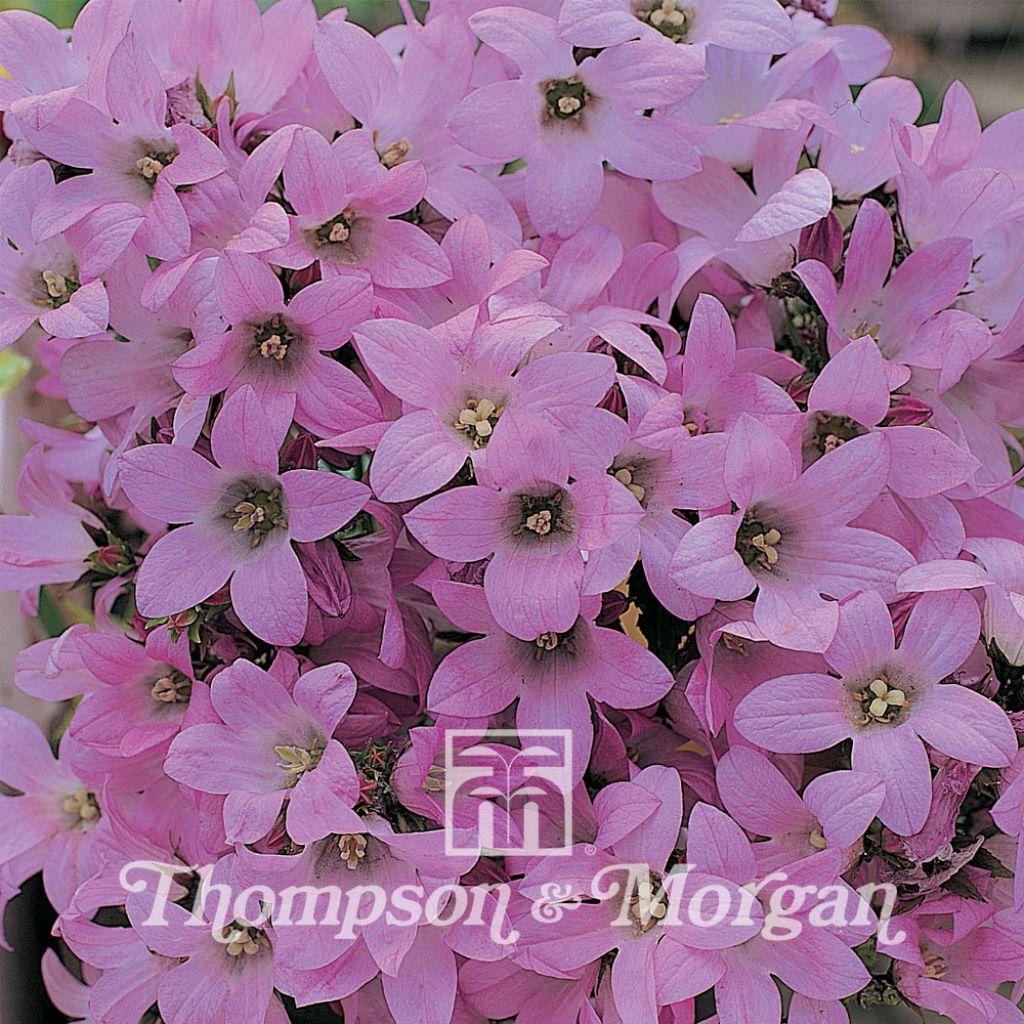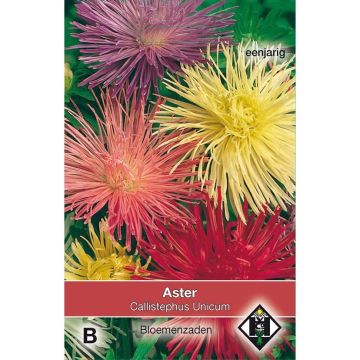

Milky bellflower Dwarf Pink Seeds - Campanula lactiflora Dwarf Pink
Milky bellflower Dwarf Pink Seeds - Campanula lactiflora Dwarf Pink
Campanula lactiflora Dwarf Pink
Milky Bellflower
The seeds didn't germinate!
Isabelle B., 30/10/2017
Why not try an alternative variety in stock?
View all →This plant carries a 6 months recovery warranty
More information
We guarantee the quality of our plants for a full growing cycle, and will replace at our expense any plant that fails to recover under normal climatic and planting conditions.
Seed-only orders are dispatched by sealed envelope. The delivery charge for seed-only orders is €3.90.
Does this plant fit my garden?
Set up your Plantfit profile →
Description
Milky Bellflower ‘Dwarf Pink’ is a perennial with an upright growth habit which, despite its height of 60 to 90 cm, is considered dwarf because it is much smaller than other varieties of the same species, that tend to grow between 120 and 150 cm tall.
The foliage of Campanula lactiflora Dwarf Pink consists of long slender, oblong, toothed medium green leaves.
From May to August the sturdy upright stems of the Milky Bellflower bear panicles made of 1 to 3 cm wide, deep pink flowers. The flowers are shaped like wide-open bells. In areas exposed to wind, stems should be staked in order to avoid their collapsing.
It is an excellent fast-growing perennial that blooms the same year it is sown. The first season the plant will reach a height of 30 cm which will then double the following year. Milky Bellflower ‘Dwarf Pink’ thrives in all good quality garden soils as long as they are free-draining. The presence of chalk/limestone does not bother it. It prefers a partly shaded position but it can also tolerate full sun.
Its robust flowering stems will blend perfectly into your summer floral arrangements.
It is a considerable ecological asset since all summer long, the melliferous flowers of the Milky Bellflower attract pollinating insects and butterflies in the garden. It’s a good way to improve the ecosystem of your garden and boost fruit and vegetable production.
Report an error about the product description
Flowering
Foliage
Plant habit
Botanical data
Campanula
lactiflora
Dwarf Pink
Campanulaceae
Milky Bellflower
Cultivar or hybrid
Other Campanula (Bellflower) seeds
Planting and care
Sow Milky Bellflower in a seed tray, from February to June and from September to October. Use a good quality seeding compost. Lightly firm down the surface of the soil before sowing. Sow by sprinkling the seeds evenly by hand. Don’t cover the seeds but water thoroughly with a fine rose. Place your seed tray in the light, but not in direct sunlight, at a temperature between 15 °C and 20 °C.
The seeds will take 30 to 90 days to sprout. As soon as the plants are large enough to be handled, prick them out in 7 cm pots. 15 days before placing them in their final locations, start to acclimatize them gradually to a temperature of 15 °C.
At the end of May to the beginning of June temperatures will be warm enough in the garden to plant out your seedlings. Choose a sunny spot. Add a little shovel of compost to each planting hole. Place your plants 40 cm apart.
Regularly remove spent flowers in order to maintain the plant’s tidy appearance and encourage further blooming.
Sowing period
Intended location
-
, onOrder confirmed
Reply from on Promesse de fleurs
Flower seeds
Haven't found what you were looking for?
Hardiness is the lowest winter temperature a plant can endure without suffering serious damage or even dying. However, hardiness is affected by location (a sheltered area, such as a patio), protection (winter cover) and soil type (hardiness is improved by well-drained soil).

Photo Sharing Terms & Conditions
In order to encourage gardeners to interact and share their experiences, Promesse de fleurs offers various media enabling content to be uploaded onto its Site - in particular via the ‘Photo sharing’ module.
The User agrees to refrain from:
- Posting any content that is illegal, prejudicial, insulting, racist, inciteful to hatred, revisionist, contrary to public decency, that infringes on privacy or on the privacy rights of third parties, in particular the publicity rights of persons and goods, intellectual property rights, or the right to privacy.
- Submitting content on behalf of a third party;
- Impersonate the identity of a third party and/or publish any personal information about a third party;
In general, the User undertakes to refrain from any unethical behaviour.
All Content (in particular text, comments, files, images, photos, videos, creative works, etc.), which may be subject to property or intellectual property rights, image or other private rights, shall remain the property of the User, subject to the limited rights granted by the terms of the licence granted by Promesse de fleurs as stated below. Users are at liberty to publish or not to publish such Content on the Site, notably via the ‘Photo Sharing’ facility, and accept that this Content shall be made public and freely accessible, notably on the Internet.
Users further acknowledge, undertake to have ,and guarantee that they hold all necessary rights and permissions to publish such material on the Site, in particular with regard to the legislation in force pertaining to any privacy, property, intellectual property, image, or contractual rights, or rights of any other nature. By publishing such Content on the Site, Users acknowledge accepting full liability as publishers of the Content within the meaning of the law, and grant Promesse de fleurs, free of charge, an inclusive, worldwide licence for the said Content for the entire duration of its publication, including all reproduction, representation, up/downloading, displaying, performing, transmission, and storage rights.
Users also grant permission for their name to be linked to the Content and accept that this link may not always be made available.
By engaging in posting material, Users consent to their Content becoming automatically accessible on the Internet, in particular on other sites and/or blogs and/or web pages of the Promesse de fleurs site, including in particular social pages and the Promesse de fleurs catalogue.
Users may secure the removal of entrusted content free of charge by issuing a simple request via our contact form.
The flowering period indicated on our website applies to countries and regions located in USDA zone 8 (France, the United Kingdom, Ireland, the Netherlands, etc.)
It will vary according to where you live:
- In zones 9 to 10 (Italy, Spain, Greece, etc.), flowering will occur about 2 to 4 weeks earlier.
- In zones 6 to 7 (Germany, Poland, Slovenia, and lower mountainous regions), flowering will be delayed by 2 to 3 weeks.
- In zone 5 (Central Europe, Scandinavia), blooming will be delayed by 3 to 5 weeks.
In temperate climates, pruning of spring-flowering shrubs (forsythia, spireas, etc.) should be done just after flowering.
Pruning of summer-flowering shrubs (Indian Lilac, Perovskia, etc.) can be done in winter or spring.
In cold regions as well as with frost-sensitive plants, avoid pruning too early when severe frosts may still occur.
The planting period indicated on our website applies to countries and regions located in USDA zone 8 (France, United Kingdom, Ireland, Netherlands).
It will vary according to where you live:
- In Mediterranean zones (Marseille, Madrid, Milan, etc.), autumn and winter are the best planting periods.
- In continental zones (Strasbourg, Munich, Vienna, etc.), delay planting by 2 to 3 weeks in spring and bring it forward by 2 to 4 weeks in autumn.
- In mountainous regions (the Alps, Pyrenees, Carpathians, etc.), it is best to plant in late spring (May-June) or late summer (August-September).
The harvesting period indicated on our website applies to countries and regions in USDA zone 8 (France, England, Ireland, the Netherlands).
In colder areas (Scandinavia, Poland, Austria...) fruit and vegetable harvests are likely to be delayed by 3-4 weeks.
In warmer areas (Italy, Spain, Greece, etc.), harvesting will probably take place earlier, depending on weather conditions.
The sowing periods indicated on our website apply to countries and regions within USDA Zone 8 (France, UK, Ireland, Netherlands).
In colder areas (Scandinavia, Poland, Austria...), delay any outdoor sowing by 3-4 weeks, or sow under glass.
In warmer climes (Italy, Spain, Greece, etc.), bring outdoor sowing forward by a few weeks.





















































